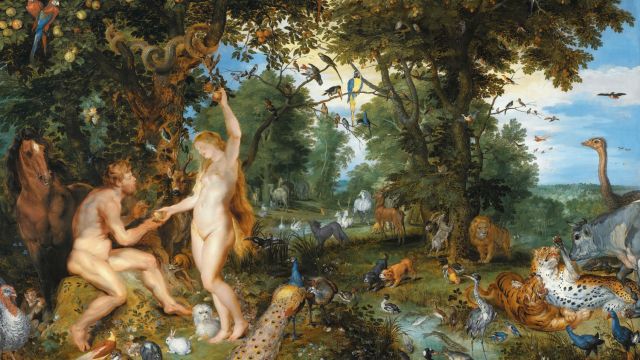‘Natural’ Doesn’t Always Mean Good, Part Two

TWO

The leaves float down as we walk along a stream snaking through the trees. The water splashes over rocks that have tumbled down from Appalachian mountains now worn soft and low, but which in their youth, a quarter of a billion years ago, rose higher than the Himalayas. The autumn red and orange and yellow of the oaks and maples and birch mix with the evergreen of the firs, turning the rolling White Mountains into the dappled impressionist landscape that annually brings millions to celebrate the natural beauty of these woods.
Except, 150 years ago these woods weren’t here. This was all open farmland, the timber cut down and the rocky fields cleared to help build and feed an expanding America. Now regrown, these pretty forests and the gentle mountains they cover are a gift, not just for their natural aesthetics, but as a reminder of how, despite all our human insults and demands, the patient and persistent forces of the natural world that some refer to as Gaia will just keep going.
The environmental philosopher James Lovelock chose the Greek Mother Goddess Gaia, who created the Earth and all the universe, to represent nature as a single dynamic living system, the product of the hydrological and geological cycles and chemical cycles, and the diverse biological cycles of all living species, including, but hardly revolving around, Homo sapiens. These components, including us, are all just interactive parts of one larger living being. It’s interesting that Lovelock’s eco- rather than anthropo-centrism borrows Gaia from Greek myth, because humans were not a part of the Greek genesis story. They come along much later, as relatively powerless playthings for the Gods. Hardly the center of things. Hardly the ultimate force in charge.
But Greek myth did recognize the threat humans posed to the natural world. Prometheus was harshly punished for stealing fire from Zeus and giving it to humans. Interestingly, Zeus not only punished Prometheus for giving fire to humans. He punished humans too, giving them Pandora and her mysterious jar, which curious humans opened, setting free all the ills of the world. (It’s also noteworthy that in one version of Greek myth the only thing left in Pandora’s jar when she finally got the lid back on, that didn’t escape into the world of humans, was Hope.)
Christianity’s God too realized the mess humans would make of Eden if they got too powerful by eating from the Tree of Knowledge. And as were the humans in Greek myth, Christianity’s humans were cursed with suffering for gaining power they weren’t supposed to have. The ancient authors of these two different faith stories perceptively foresaw just what environmentalists today rightly decry, that knowledge and technological power have made humans a uniquely dangerous species to the natural world.
With the powers of knowledge and fire — reason and technology — we have made life much better for humans in many ways. But we have also done horrific, tragic, sweeping damage to the natural world of which we are a part and on which we depend. Such damage, in fact, that we threaten our own existence. The threat to Nature in its current state is very real. Which is very different from ending it altogether, of course, but then we tend to see all things from where we stand, which means that of the whole long story of the Earth before us and long after we’re gone, we only think in terms of how things are now.
That myopia, about human time scales versus natural time scales, is the same selective hubris classical environmentalists have about our powers of reason. We’re smart enough, they argue, to use reason “to solve these problems.” That’s myopic too, because the truth is that we just aren’t as smart as we think we are. Yes we are blessed with the powerful ability to reason, but we are also saddled with the even-more powerful instincts and innate biology that mostly compel our choices and behaviors. Evidence from many fields developed in the past several decades has resoundingly disproved the appealing, but naïve Enlightenment belief in the superiority of reason, and convincingly shown that human judgment and decision-making are the product of what Melissa Finucane and Paul Slovic and others call the Affect Heuristic; the general mental shortcut our brain uses to quickly and subconsciously take the facts we have (usually only a few), run them through filters of emotion and experience and instinct and life circumstances and needs, and produce our affective perceptions of the world, and our behaviors.
The evidence is clear that Ambrose Bierce was right when he wrote in The Devil’s Dictionary (paraphrasing);
Brain (n) the organ with which we think we think.
How stunningly, dangerously, naïve, then, to believe that we can outthink our instincts, that we can consciously overcome the deep biologically embedded survival imperative that compels our behaviors farmore than does relatively weaker reason … to believe that we are so smart that we can outsmart Nature itself.
In fact, there is almost an immorality in the arrogant claim that we are so different and so smart that human wisdom can conquer natural instinct, that “we can choose restraint,” that we can “think globally” and do what’s best not just for ourselves, but for all. How piously easy that is to proclaim for those who sit comfortably sheltered, fed, and safe at the very top of Maslow’s hierarchy of needs. At the bottom levels of the hierarchy, where the needs are food and water and shelter and safety — you know, the basic levels at which the vast majority of humans live their lives — our brain is principally occupied with meeting our immediate instinctive personal needs in pursuit of survival.
Indeed the proof that we aren’t as smart as Wilson and McKibben and others hope we can be is the very damage that environmentalists lament, the irrational damage we’re doing to the biological systems on which our own long-term survival depends. That’s pretty dumb for creatures supposedly smart enough to be able to figure things out rationally and save ourselves from ourselves. If we were that smart, would we have caused climate change in the first place, or driven species we depend on for food to near extinction, or filled our air and water with pollutants and filth that kill hundreds of millions of people each year? Wilson scolds, “Civilization was purchased by the betrayal of Nature.” So for 11,000 years we’ve had reason, and it hasn’t kept us from making a hell of a mess. Indeed — as foreseen in the Bible — the very power of reason that the enviro-prophets promise as our salvation has played a central role in causing the very problems that those preachers suggest reason can now solve.
Assuming that humans are smart enough to overcome our natural instincts, in the face of all the evidence that virtually screams, “NO, WE’RE NOT,” is pretty dumb all by itself. But worse, assuming that we’re smarter and more intellectually in control of our behaviors than we actually are gives us a false sense of power and hope. It lets us pretend we can think our way out of the mess we’ve made. It allows the fantasy that we can overcome the deep animal instincts of the species Homo sapiens, and the further fantasy that Back to The Garden is where reason ought to, and can, take us.
Part One. More coming in the conclusion, Part Three.
Garden of Eden Image by Jan Brueghel the Elder and Pieter Paul Rubens





